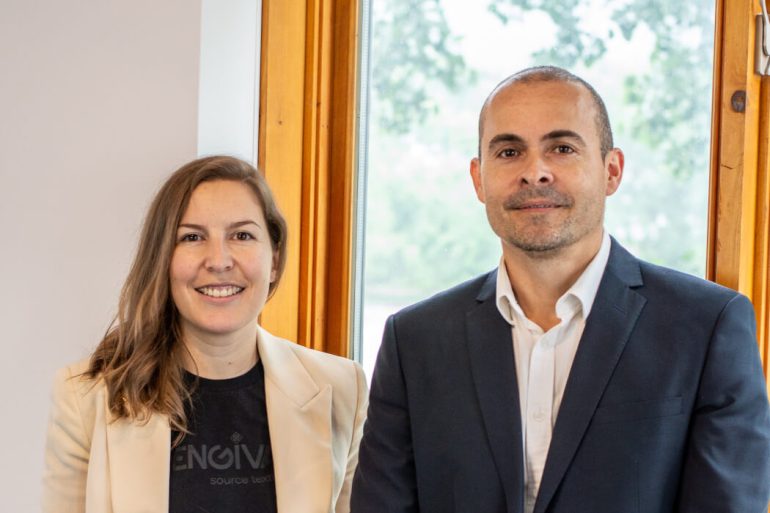Montréal-based software startup Tengiva wants to help the textile sector modernize its supply chain operations.
Tengiva claims to offer “the first digital supply chain platform for the textile industry.” Armed with $4.95 million CAD in seed funding, the company plans to commercialize its software, build a new warehouse, and pursue its global expansion plans.
Tengiva has set out to solve the textile industry’s “complex and outdated” approach to sourcing and distribution.
In an interview with BetaKit, Tengiva co-founder and CEO Annie Cyr described the textile industry as “one of the oldest and biggest in the world.” But according to Cyr, the sector’s focus has always been on machinery and the technical processes used to make textiles. As a result, Cyr says the textile industry has neglected to address its “complex and outdated,” months-long, mostly offline approach to sourcing and distribution.
Cyr and Tengiva co-founder Carlos Agudelo want to change this. “The first major problem we address is this inefficiency in terms of communication and processes around distribution and sourcing,” said Cyr.
Tengiva’s seed round—the company’s first venture financing to date—was led by Fonds Ecofuel, with participation from fellow Montréal VC firm Inovia Capital, Anges Québec, Vancouver-based Active Impact Investments, and Toronto’s N49P Ventures. The round consists of $3.15 million in equity capital, $1.7 million in commercialization funding from Investissement Québec, and a $100,000 grant from Sustainable Development Technology Canada.
Launched in 2018 by Cyr and Agudelo, Tengiva’s COO and CSO, Tengiva helps textile manufacturers and apparel companies source and sell materials across 30 countries through its supply chain management platform. Tengiva’s software makes it easier for clothing brands to find and buy the materials they need, while also helping textile suppliers sell their products online.
It’s safe to say that Cyr knows a bit about textiles—she has spent the last 15 years working in and around the industry, first as a fashion designer before switching over to the management side and working in development and procurement roles at family apparel firm Gildan and uniform company Logistik Unicorp. She even penned a 2016 book on textiles, titled “The Guide to Textile Fibers.”
RELATED: TealBook looks to become global leader in supply chain data with $50 million in new funding
Cyr and Agudelo met while working together at Logistik Unicorp, Cyr as a specialist in textile development and sourcing, Agudelo as the company’s director of research and development. Agudelo is a doctor of engineering with more than 30 years of experience in textile production operations and polymer science research.
Tengiva has been building its solution since 2018, years before the pandemic hit and changed the way companies thought about managing their supply chains.
As Cyr puts it, COVID-19 “really shook” the textile industry. According to Cyr, most of the textile sector’s business development operations previously took place in-person, and involved travel and trade shows—two things halted by the pandemic.
“They were really hit hard in terms of their traditional business development, and they were faced with, ‘Okay, we have to shift’—it’s not, ‘we want to’—it’s, ‘we have no choice [but] to shift because we can’t travel,” said Cyr.
Cyr added that COVID-19 has helped Tengiva in “a lot of ways,” by forcing textile companies “to open themselves up to doing business faster in a new way.”
Fonds Ecofuel Managing Partner Johanne Sevigny told BetaKit that “Tengiva is at the right place and at the right time.” Sevigny is joining the company’s board of directors as part of the round, alongside Active Impact Managing Partner Mike Winterfield.
In addition to helping textile manufacturers and apparel brands source and sell materials, Tengiva aims to give them access to the data and recommendations necessary to lessen their environmental impact. Tengiva’s platform provides customers with the information they need to optimize their resource usage, improve the transparency of their supply chain, and promote better, more eco-friendly practices that reduce CO2 emissions and chemical usage, and increase recyclability.
Given this approach, cleantech-focused investors like Fonds Ecofuel and Active Impact Investments have bought into the startup’s vision. Sevigny said Fonds Ecofuel decided to invest in Tengiva for a few reasons, citing the strength and knowledge of the company’s founding team, the pollution caused by the fashion and textile industry, and the potential environmental benefit that could be achieved by increasing its efficiency.
RELATED: Axya raises $3.9 million in seed extension to scale deployment of supply chain software
“Leveraging their expertise, they have created a purpose-built platform for the industry that not only solves some of the sustainability challenges faced by the sector but has also attracted early interest from the world’s most notable textile mills and apparel brands,” said Sevigny.
Tengiva isn’t the only Canadian trying to address supply chain problems with software. This group includes: Toronto-based procurement intelligence platform TealBook, which focuses on supply chain data; Calico, a Toronto startup that wants to help direct-to-consumer fashion brands improve their supply chain operations; and Montréal-based Axya, which helps large manufacturing companies organize their outsourcing process.
In the textile supply chain market specifically, Cyr says there are other solutions available in terms of “catalogues as a marketplace,” but believes Tengiva’s ability to help with logistics, payments, and operations serves as a differentiator.
“Where we position ourselves differently is that we enable the transactions processes … So far, we’re, I would say, the only one capable of doing it at an industrial scale,” said the CEO.
Tengiva plans to use some of its funding to open a new Montréal warehouse based out of an old textile mill that will focus on managing textile samples and helping customers digitize their products in its database.
Feature image courtesy Tengiva.


